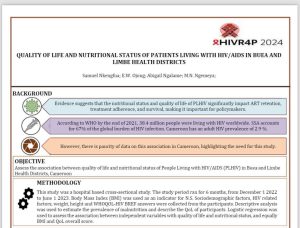A groundbreaking study has shed light on the direct link between nutritional status and quality of life for people living with HIV (PLHIV) in Cameroon.
Conducted across Buea and Limbe Health Districts, the research reveals that malnutrition is still a significant issue among this vulnerable population and that it plays a critical role in how well individuals adhere to antiretroviral therapy (ART) and ultimately survive.
Dr. Nkengfua Samuel, the principal investigator, presented these findings at the 5th HIV Research for Prevention (HIVR4P 2024) conference holding in Lima, Peru.
With over four years of experience focusing on healthcare access, health system strengthening, and disease control, Dr. Nkengfua is no stranger to the importance of such data in driving policy change.
His research, which spanned six months, from December 2022 to June 2023, involved 500 participants aged between 23 and 73 years.
Using Body Mass Index (BMI) as an indicator of nutritional status, the study revealed that about 8% of participants were underweight, while 33% were overweight and 22% obese.
Alarmingly, this imbalance in nutrition had a direct impact on their overall quality of life.
« Quality of life was generally good for just over half the participants, » Dr. Nkengfua explains. « But what stood out was the significant association between poor nutritional status and a lower quality of life. Our findings suggest that nutritional interventions are just as important as ART adherence in improving health outcomes for PLHIV. »
In fact, the study highlighted several key factors associated with poor quality of life, including being single, female, in the lower wealth bracket, and having limited education.
Additionally, individuals who were underweight were more likely to have detectable viral loads and be in the more advanced stages of HIV.
On the flip side, those who adhered to ART and had no detectable viral load enjoyed better quality of life. The data is clear: better nutrition equals better health, a crucial message for healthcare providers and policymakers alike.
« The relationship between quality of life and nutritional status cannot be ignored, »Dr. Nkengfua emphasized.
« Healthcare programs for PLHIV need to incorporate consistent monitoring of nutritional status, offer dietary counseling, and provide support to address malnutrition. »
This study, though focused on two districts, reflects a broader challenge in Cameroon’s HIV care landscape. As the country continues to combat the epidemic, these findings offer valuable insights into how improving nutritional status can go hand-in-hand with ART to significantly enhance the lives of PLHIV.
Dr. Nkengfua’s hope is that these results will not just be numbers on a page but a call to action for integrating comprehensive nutritional support into Cameroon’s HIV care programs. After all, as this research shows, fighting HIV is not just about the medicine—it’s about improving the whole person’s well-being.
By Gladys Asu Ngouana in Lima, Peru











